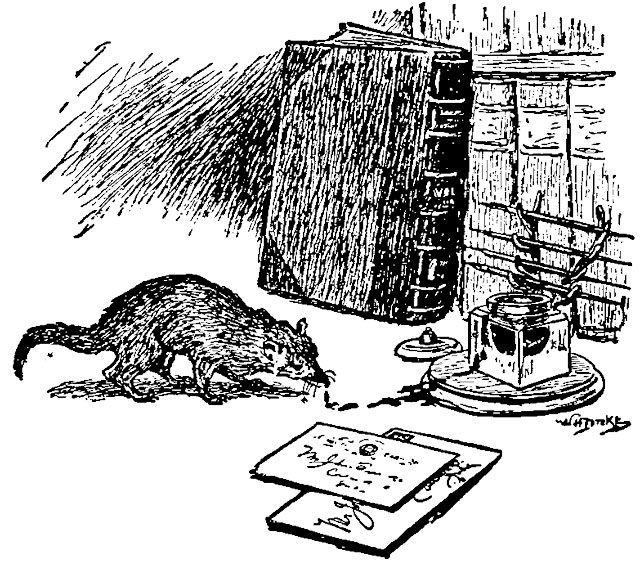Competency #12
Understand the nature of research, research methods and research findings; retrieve, evaluate and synthesize scholarly and professional literature for informed decision-making by specific client groups

Illustration of Rikki Tikki Tavi by W.H. Drake from The Jungle Book, 1894
The motto of the mongoose family in Kipling’ “Rikki Tikki Tavi” is “Run and Find Out”. I admire the energetic pursuit of information in service of a goal, and I believe, turning again to Kipling, that intellectual “ ‘satiable curtiosity” ought to be part of the nature of every competent librarian, well-supported by trained expertise.
The hyphen in this competency separates two levels of research. The first level broadly encompasses the competent librarian’s judgment and knowledge about how best to support library users during their information searches. This level begins with the type of routine or ready research often done for and with public library patrons or K-12 students. Although the format for the information may be digital, a competent librarian should be familiar with the basic sources traditionally found behind the reference desk. Users often find their faith in Google challenged when a piece of information held in a proprietary reference source fails to appear; they turn to the librarian who can direct them to indexes such as Ulrich’s for information on older periodicals, or to directories which are not well-known, such as Associations Unlimited.
Though information searches may not always be complex, contemporary library competency requires a substantial knowledge of online search techniques and available resources. This has become increasingly important as the prevalence of natural language searches has decreased the average user’s ability to conduct a search in a controlled language environment. Basic knowledge of Boolean search terms, Library of Congress subject headings, and the structural quirks of common databases make a librarian invaluable to the average user. Often a natural language, Google-type search is an appropriate strategy, but many information seekers require and appreciate assistance in choosing effective, appropriate, and imaginative search terms. Even for scholars the number and variety of sources available online can be overwhelming— it is important that a librarian is prepared to serve as a guide or editor during searches, able to direct the searcher to the most relevant periodical, the appropriate database, or the most authoritative site or work.
Another aspect of research in support of user searches is the preparation of support materials and guides. Creating subject guides or pathfinders for searchers requires a thorough knowledge not only of local resources but of important collections, digital archives, and expert work in a field. After completing a survey of these resources, the librarian must then focus his findings to be useful and appropriate for his target audience, updating the material as information or availability changes.
The second level of research described in this competency is professional work done by the librarian herself when asked not for assistance but for a product. This second type of research begins with the knowledge and skills necessary for general research assistance, but soon surpasses that level, requiring also perhaps substantial composition, comparative analysis, an exhaustive survey, and a deep understanding of the goals and requirements of the intended recipient. This kind of work might be done by a librarian in a legal or corporate setting, or in an academic library in support of faculty research. There is some disagreement among librarians about whether subject knowledge should be considered as important as information expertise, but many would agree that for advanced research production a competent librarian would require strong subject-specific background and knowledge.
Occasionally librarians are required to pursue research and produce reports for their own organizations. Cautious organizations see the benefit of an examination of current scholarship on ‘best practices’, an overview of effective reforms, or a collection of cautionary examples;a competent librarian will provide an accurate survey of factors affecting success in a proposal. I have worked on such reports for school groups involved in high school redesign—it takes considerable professionalism to avoid skewing the report to reflect the researchers’ own opinions and preferences.
In evidence of my competency in research methods I am displaying an assignment for Libr 210, Reference and Information Services, which required students to choose from a long list of standard reference works the source most appropriate to use for answering each of a long list of questions. This was a very enjoyable exercise, a kind of intellectual scavenger hunt which really increased my familiarity with a long list of resources. Out of curiosity, I tried many of these searches on Google to compare the efficacy of the reference sources to the open Internet. I can now share the results of my research: many of these reference tools hold material which is not given away free on Google.
As evidence of ability both to conduct thorough research and to use good professional judgment in choosing among many sources for a final product, I include two different assignments. The first is an annotated bibliography I created for Libr 200, Information and Society, after doing a literature review preliminary to a paper on Internet filters for high school libraries. The second, which was completed in two parts for Dr. Loertscher’s Libr 233, School Library Media Centers, is a survey of current journal articles and multi-media resources on that topic. Both assignments demonstrate the resourcefulness of my searches and show that I am able to synthesize complex content for presentation.
